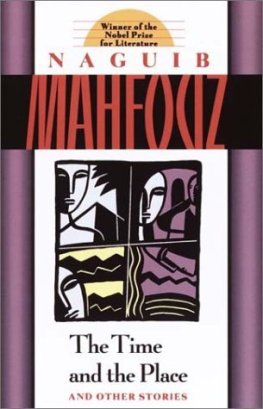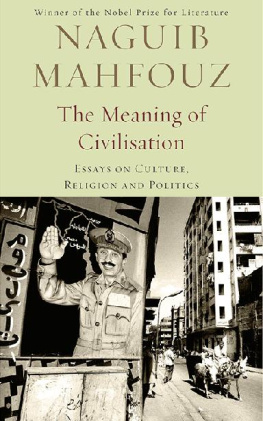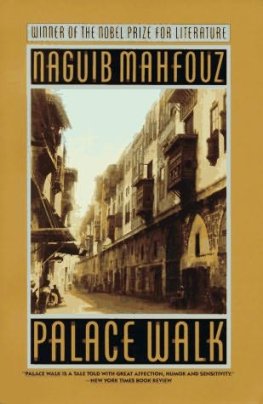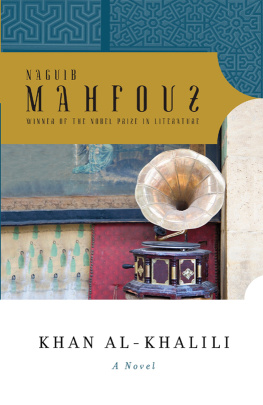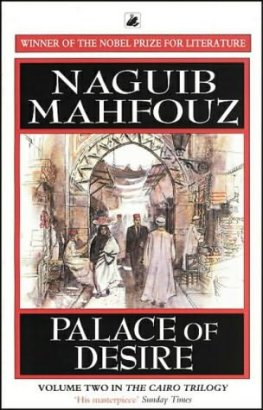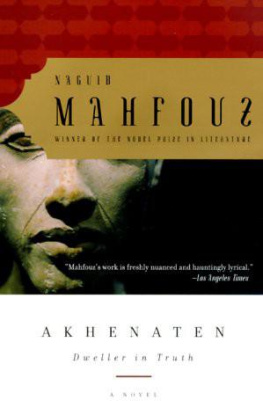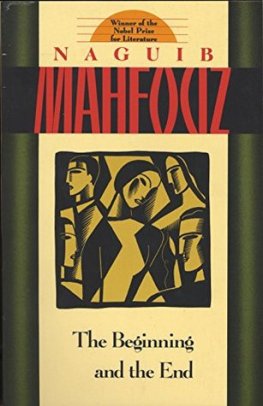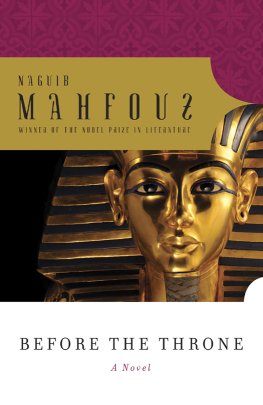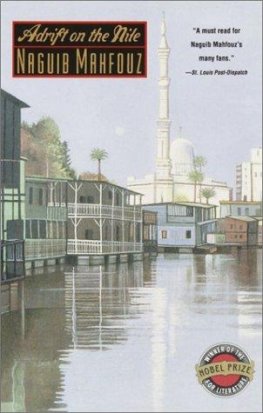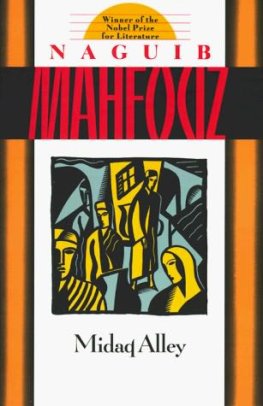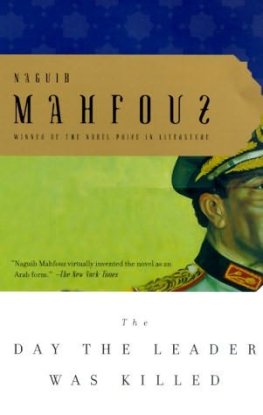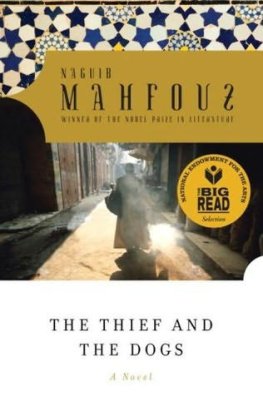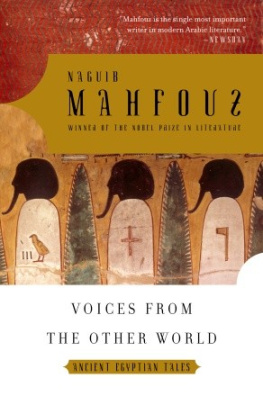Naguib Mahfouz - On Literature and Philosophy: The Non-Fiction Writing of Naguib Mahfouz: Volume 1
Here you can read online Naguib Mahfouz - On Literature and Philosophy: The Non-Fiction Writing of Naguib Mahfouz: Volume 1 full text of the book (entire story) in english for free. Download pdf and epub, get meaning, cover and reviews about this ebook. year: 2015, publisher: The Gingko Library, genre: Religion. Description of the work, (preface) as well as reviews are available. Best literature library LitArk.com created for fans of good reading and offers a wide selection of genres:
Romance novel
Science fiction
Adventure
Detective
Science
History
Home and family
Prose
Art
Politics
Computer
Non-fiction
Religion
Business
Children
Humor
Choose a favorite category and find really read worthwhile books. Enjoy immersion in the world of imagination, feel the emotions of the characters or learn something new for yourself, make an fascinating discovery.

- Book:On Literature and Philosophy: The Non-Fiction Writing of Naguib Mahfouz: Volume 1
- Author:
- Publisher:The Gingko Library
- Genre:
- Year:2015
- Rating:4 / 5
- Favourites:Add to favourites
- Your mark:
- 80
- 1
- 2
- 3
- 4
- 5
On Literature and Philosophy: The Non-Fiction Writing of Naguib Mahfouz: Volume 1: summary, description and annotation
We offer to read an annotation, description, summary or preface (depends on what the author of the book "On Literature and Philosophy: The Non-Fiction Writing of Naguib Mahfouz: Volume 1" wrote himself). If you haven't found the necessary information about the book — write in the comments, we will try to find it.
Naguib Mahfouz: author's other books
Who wrote On Literature and Philosophy: The Non-Fiction Writing of Naguib Mahfouz: Volume 1? Find out the surname, the name of the author of the book and a list of all author's works by series.
On Literature and Philosophy: The Non-Fiction Writing of Naguib Mahfouz: Volume 1 — read online for free the complete book (whole text) full work
Below is the text of the book, divided by pages. System saving the place of the last page read, allows you to conveniently read the book "On Literature and Philosophy: The Non-Fiction Writing of Naguib Mahfouz: Volume 1" online for free, without having to search again every time where you left off. Put a bookmark, and you can go to the page where you finished reading at any time.
Font size:
Interval:
Bookmark:

Naguib Mahfouz
On Literature and Philosophy
The Non-Fiction Writing of Naguib Mahfouz Volume I
Translated by Aran Byrne


First published in the United Kingdom in 2016 by
Gingko Library
70 Cadogan Place, London SW1X 9AH
Originally published in Arabic as awla l-Adab wa-l-Falsafa
Copyright 2015 Dar Al Masriah Al Lubnaniah, Cairo
Translation Copyright Aran Byrne, 2016
A CIP catalogue record for the book is available from the British Library
ISBN 978-1-909942-77-6
eISBN 978-1-909942-78-3
www.gingkolibrary.com
@gingkolibrary
Contents
Introduction
by Rasheed El-Enany
Scholars and devoted readers of Naguib Mahfouz in English will be delighted to see in print this volume containing a good number of his early essays collected for the first time between the two covers of a book. Readers of Arabic have beat them to that pleasure in 2003 when the collection first saw the light when Mahfouz still had three years to live. Most of the essays belong to the 1930s decade with a few from the 1940s. When Mahfouz started writing those essays, the first of which in this volume dates back to October 1930, he was still an undergraduate student reading philosophy at Cairo University, then known as Fuad I University. At that time he had not written any fiction yet and little did he know that he was destined to become the real father of the genre in Arabic and renowned novelist and Nobel laureate with an international following. He still had a few years in which to settle what he often referred to as the fight between philosophy and literature over his soul in favour of the latter. The first of the articles in this volume was published in Al-Majalla al-Jadida the very same publication that 9 years later, in 1939, was to publish in a supplement his first novel, The Mockery of Fate, or Khufus Wisdom, as the title was rendered, many years later, in its English translation. Edited by the progressive writer, Salama Musa (18871958), who advocated secularism and socialism during a period that has in retrospect come to be regarded as the peak of liberal thinking in 20th century Egypt, the young Mahfouz appears to have found a natural home for his budding talent, although as this collection shows he also published in other newspapers and literary magazines of the day.
The first essay, titled The Demise of Old Beliefs and the Emergence of New Ones could have been written by Salama Musa himself, whose influence Mahfouz has repeatedly acknowledged. In this inaugural essay, penned by Mahfouz when he was only 19 years old, we find the germination of many a central theme that was to persist with him in his more mature years and to recur time and again in the social and philosophical ideas that inhabit his fiction. This is why this volume is important for the study and understanding of Mahfouz and his development as a writer and thinker. Most of the existing scholarship on Mahfouz has not benefited from these early essays because, as already indicated, until 2003, when Mahfouz had already been a world famous Nobel laureate since 1988 with his achievement largely behind him, the essays had remained scattered in long-defunct literary magazines hard to come by even in libraries. Nor to the best of my knowledge was there a list of them that could usefully be used as a guide by a determined researcher. Above all, Mahfouz himself was not a great help in the matter. He was indifferent about the essays as mere juvenilia and had routinely declined propositions to collect and publish them. When he finally relented and the essays became available, it was not difficult to see at one and the same time why he had thwarted efforts to collect them for so long, but also why he was wrong to do so.
The essays have little value in their own right today, though they may have served a good purpose indeed as part of the ongoing endeavour of public enlightenment undertaken by the intellectual class of the day in that golden age of liberal thought in Egypt. They are mostly expository essays engaging with western thought and ideologies, whether philosophical, political, social, literary or religious, with the majority being on philosophy and its erstwhile satellite disciplines of psychology and philology clearly a reflection of his own immersion in the subject he specialised in as a university student, but also of the ideas and their major exponents that preoccupied him as they did others at the time and that he wanted to share with his readership. There is hardly any original contribution there, while at present much of the content, if not dated, is taken for granted and has long been in the public arena. Where the interest lies today in reading these essays is in tracing Mahfouzs own intellectual sympathies with regard to the thinking and ideologies he expounds. With the benefit of hindsight, scholars of Mahfouz can recognise in these essays the origins of much of what was later to become his intellectual hallmark.
To go back to his first essay in the volume, The Demise of Old Beliefs and the Emergence of New Ones this for instance immediately reveals the secularist Mahfouz who rejects the sacredness of any beliefs, and welcomes the commotion brought about by new ideas, because that is how progress is achieved. This is the nascent Mahfouz who will write decades later a controversial novel, called The Children of our Alley (1959) (later translated as Children of Gebelawi and again as Children of the Alley), which will lead to an attempt on his life by a religious fanatic, and in which he casts old prophets of Judaism, Christianity and Islam in a thinly disguised allegory, as nothing more than social reformers, whose role and that of religion was replaced by belief in science in modern times. In that same essay we also see the beginnings of Mahfouzs belief in socialism as humanitys best answer to date to social ills. These thoughts, concerned with socialism, secularism and the role of religion in modern society, were soon after to find their concrete representations in Mahfouzs earliest realistic novels, set in the Cairo of the 1930s and 1940s, Khan al-Khalili (1945) and The New Cairo (1946), translated as Cairo Modern.
The majority of the essays consist of sweeping summaries of philosophical schools, worthy of a concise encyclopaedia: Socrates, Plato, Aristotle, the Sophists, the Stoics, the Epicureans, the Neo-Platonists are all there, as are Descartes, Kant, David Hume, John Stuart Mill, Bergson, William James, Pavlov, and plenty others, including scores of less resonant names. Interestingly, indeed bewilderingly, in all these hosts of names of thinkers and theorisers and in all his expositions of a multitude of philosophical schools, there is not to be found any reference to Islamic philosophy or any of its major figures, whose influence on western philosophy and role as conduits of Greek thought to Europe as it awakened from medievalism into the Renaissance, is well-established; we do not come here, not for once, across such illustrious names as al-Kindi, al-Farabi, Avicenna, the Brethren of Purity, Ibn Arabi, Averroes etc. No programme of study of philosophy could afford not to stop at those figures, no more then than now. How then can we explain that the young Mahfouz, who seemed to take it upon himself to educate his 1930s and 40s readers in philosophy, passing on to them in simplified manner what he had been studying in his specialised academic discipline, that he completely overlooked, consciously or unconsciously, to enlighten them on the Muslim contribution to philosophy? What inferences can be made from this glaring omission? I can think of none except that he was wholeheartedly immersed in western thought and the European model as the gateway to modernity. In the learned milieu of the day that formed the background to Mahfouzs intellectual formation, there were two conflicting tendencies: one revivalist in nature harking back to the Arabo-Islamic roots of Egypt, and another that took pride in Egypts ancient civilisation on the one hand and saw its future, on the other, in the embracement of the European model, bypassing largely its Arabo-Islamic phase. Mahfouz was undoubtedly an adherent of the latter. Several of his early short stories and more importantly his first three full-length novels, were historical ones, set in Ancient Egypt; indeed part of a huge project to document the entire history of Ancient Egypt in a series of grand narratives after the Scottish model of Walter Scott, but which he abandoned after the first three instances in favour of realism and the depiction of the contemporary social scene. This early shift to the contemporary scene came only to confirm his already recognisable alignment: in his early realistic novels such as
Next pageFont size:
Interval:
Bookmark:
Similar books «On Literature and Philosophy: The Non-Fiction Writing of Naguib Mahfouz: Volume 1»
Look at similar books to On Literature and Philosophy: The Non-Fiction Writing of Naguib Mahfouz: Volume 1. We have selected literature similar in name and meaning in the hope of providing readers with more options to find new, interesting, not yet read works.
Discussion, reviews of the book On Literature and Philosophy: The Non-Fiction Writing of Naguib Mahfouz: Volume 1 and just readers' own opinions. Leave your comments, write what you think about the work, its meaning or the main characters. Specify what exactly you liked and what you didn't like, and why you think so.

